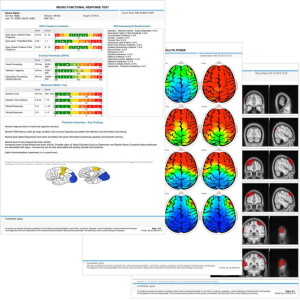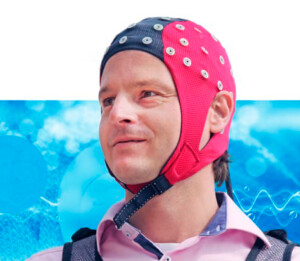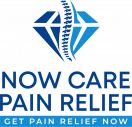We use the Brainview machine which allows for an objective and neuro functional measurement using the electroencephalogram activity of the brain (EEG), electrocardiogram activity of the heart (ECG), visual and auditory processing speeds (evoked potentials), and subjective neuropsychological survey.
 EEG (ELECTROENCEPHALOGRAM)
EEG (ELECTROENCEPHALOGRAM)
WHAT IS AN EEG?
An electroencephalogram (EEG) is a test used to evaluate the electrical activity in the brain. Brain cells communicate with each other through electrical impulses. An EEG can be used to help detect potential problems associated with this activity.
An EEG tracks and records brain wave patterns. Small flat metal discs called electrodes are attached to the scalp with wires. The electrodes analyze the electrical impulses in the brain and send signals to a computer that records the results.
The electrical impulses in an EEG recording look like wavy lines with peaks and valleys. These lines allow doctors to quickly assess whether there are abnormal patterns. Any irregularities may be a sign of seizures or other brain disorders.
Why is an EEG performed?
- seizure disorders (such as epilepsy)
- head injury
- encephalitis (inflammation of the brain)
- brain tumor
- encephalopathy (disease that causes brain dysfunction)
- memory problems
- sleep disorders
- stroke
- dementia
When someone is in a coma, an EEG may be performed to determine the level of brain activity. The test can also be used to monitor activity during brain surgery.
 ARE THERE RISKS ASSOCIATED WITH AN EEG?
ARE THERE RISKS ASSOCIATED WITH AN EEG?
There are no risks associated with an EEG. The test is painless and safe.
Some EEGs do not include lights or other stimuli. If an EEG does not produce any abnormalities, stimuli such as strobe lights, or rapid breathing may be added to help induce any abnormalities.
When someone has epilepsy or another seizure disorder, the stimuli presented during the test (such as a flashing light) may cause a seizure. The technician performing the EEG is trained to safely manage any situation that might occur.
HOW DO I PREPARE FOR AN EEG?
Before the test, you should take the following steps:
Wash your hair the night before the EEG, and don’t put any products (like sprays or gels) in your hair on the day of the test.
Ask your doctor if you should stop taking any medications before the test. You should also make a list of your medications and give it to the technician performing the EEG.
Avoid eating or drinking anything containing caffeine for at least eight hours before the test.
Your doctor may ask you to sleep as little as possible the night before the test if you have to sleep during the EEG. You may also be given a sedative to help you relax and sleep before the test begins.
After the EEG is over, you can continue with your regular routine. However, if you were given a sedative, the medication will remain in your system for a little while. This means that you’ll have to bring someone with you so they can take you home after the test. You’ll need to rest and avoid driving until the medication wears off.
WHAT CAN I EXPECT DURING AN EEG?
An EEG measures the electrical impulses in your brain by using several electrodes that are attached to your scalp. An electrode is a conductor through which an electric current enters or leaves. The electrodes transfer information from your brain to a machine that measures and records the data.
Specialized technicians administer EEGs at hospitals, doctor’s offices, and laboratories. The test usually takes 30 to 60 minutes to complete, and involves the following steps:
You’ll lie down on your back in a reclining chair or on a bed.
The technician will measure your head and mark where to place the electrodes. These spots are scrubbed with a special cream that helps the electrodes get a high-quality reading.
The technician will put a sticky gel adhesive on 16 to 25 electrodes, and attach them to spots on your scalp.
Once the test begins, the electrodes send electrical impulse data from your brain to the recording machine. This machine converts the electrical impulses into visual patterns that appear on a screen. A computer saves these patterns.
The technician may instruct you to do certain things while the test is in progress. They may ask you to lie still, close your eyes, breathe deeply, or look at stimuli (such as a flashing light or a picture).
After the test is complete, the technician will remove the electrodes from your scalp.
During the test, very little electricity passes between the electrodes and your skin, so you’ll feel very little to no discomfort.
In some instances, a person may undergo a 24-hour EEG. These EEGs use video to capture seizure activity. The EEG may show abnormalities even if the seizure does not occur during the test. However, it does not always show past abnormalities related to seizure.
WHAT DO THE EEG TEST RESULTS MEAN?
A neurologist (someone who specializes in nervous system disorders) interprets the recordings from the EEG and then sends the results to your doctor. Your doctor may schedule an appointment to go over the test results with you.
NORMAL RESULTS
Electrical activity in the brain appears in an EEG as a pattern of waves. Different levels of consciousness, like sleeping and waking, have a specific range of frequencies of waves per second that are considered normal. For example, the wave patterns move faster when you’re awake than when you’re asleep. The EEG will show if the frequency of waves or patterns are normal. Normal activity typically means you don’t have a brain disorder.
ABNORMAL RESULTS
Abnormal EEG results may be due to:
- epilepsy or another seizure disorder
- abnormal bleeding or hemorrhage
- sleep disorder
- encephalitis (swelling of the brain)
- tumor
- dead tissue due to a blockage of blood flow
- migraines
- alcohol or drug abuse
- head injury
It’s very important to discuss your test results with your doctor. Before you review the results, it may be helpful to write down any questions you might want to ask. Be sure to speak up if there’s anything about your results that you don’t understand.
CONCUSSION TESTING AND EEG
Welcome to Now Care Pain Relief, your trusted chiropractor for comprehensive concussion evaluation and EEG testing. If you or a loved one has experienced a head injury or concussion, it is crucial to seek professional medical attention immediately. A concussion is a traumatic brain injury that affects the way your brain functions and can have long-lasting effects if left untreated. At Now Care Pain Relief, we offer state-of-the-art concussion testing and EEG technology to help diagnose and treat your concussion.
Concussion Testing
Concussion testing is a crucial step in accurately diagnosing a concussion. A concussion is a type of traumatic brain injury that occurs when the brain is shaken or jolted inside the skull. The symptoms of a concussion can range from mild to severe, including headaches, dizziness, nausea, fatigue, and memory problems. A concussion can also have long-term effects on a person’s mental and physical health if not treated appropriately.
At Now Care Pain Relief, our concussion testing process involves a comprehensive evaluation of your symptoms and medical history. We use state-of-the-art technology to perform a series of tests that assess your cognitive, visual, and balance functions. These tests help us to determine the severity of your concussion and develop a customized treatment plan tailored to your specific needs.
Comprehensive Concussion Evaluation
Our comprehensive concussion evaluation is designed to assess the severity of your concussion and provide you with personalized treatment options. Our experienced chiropractors will evaluate your symptoms, medical history, and perform a series of tests to determine the extent of your concussion.
One of the tests we use is the ImPACT (Immediate Post-Concussion Assessment and Cognitive Testing) test, a computer-based tool that measures cognitive function, memory, and reaction time. The test takes about 20-25 minutes to complete and provides objective data to assist in the diagnosis and management of concussions.
We also perform a thorough physical examination to assess your neurological function, balance, and coordination. This evaluation helps us identify any underlying issues that may be contributing to your concussion and develop a tailored treatment plan that meets your individual needs.
Cognitive Assessment
Cognitive assessment is an essential part of our comprehensive concussion evaluation. A concussion can cause various cognitive problems, including memory loss, difficulty concentrating, and confusion. Our experienced medical professionals will assess your cognitive abilities using a range of cognitive tests. These tests are designed to evaluate your memory, attention, and problem-solving abilities, helping us determine the severity of your injury and developing a personalized treatment plan.
We use state-of-the-art equipment to conduct cognitive testing, including computerized neurocognitive testing. This type of testing provides a detailed analysis of your cognitive abilities and helps us track your progress throughout the recovery process. With our cognitive assessment, we can identify any cognitive deficits caused by the concussion, develop a personalized treatment plan, and monitor your progress to ensure that you recover as quickly as possible.
Balance and Vestibular Evaluation
Balance and vestibular evaluation are essential components of our comprehensive concussion evaluation. A concussion can affect your balance and vestibular system, causing dizziness, vertigo, and difficulty with coordination. Our experienced medical professionals will conduct a thorough evaluation of your balance and vestibular system to determine the extent of your injury and develop a personalized treatment plan that meets your unique needs.
We use advanced technology, including videonystagmography (VNG) and computerized dynamic posturography (CDP), to evaluate your balance and vestibular system. VNG is a non-invasive test that measures your eye movements, while CDP evaluates your ability to maintain your balance while standing on a force platform. With our balance and vestibular evaluation, we can identify any balance or vestibular deficits caused by the concussion, develop a personalized treatment plan, and monitor your progress throughout the recovery process.
Visual and Oculomotor Evaluation
Concussions can cause various vision-related problems, such as blurred vision, double vision, and sensitivity to light. Visual and oculomotor evaluation is an essential component of our comprehensive concussion evaluation. Our experienced medical professionals will evaluate your eye movements, visual processing speed, and other visual functions to determine the extent of your injury and develop a personalized treatment plan that meets your unique needs.
We use cutting-edge technology, such as infrared video goggles and eye tracking devices, to measure and evaluate your eye movements accurately. These tests can help identify any issues with your eye tracking, focusing, and coordination that may be caused by the concussion. Our visual and oculomotor evaluation will provide us with valuable information to develop a personalized treatment plan, and we will monitor your progress to ensure that you recover as quickly as possible.
Symptom Evaluation
Concussions can cause a range of symptoms that can significantly impact your daily life, including headaches, nausea, dizziness, and difficulty concentrating. Our experienced medical professionals will evaluate your symptoms to determine the extent of your injury and develop a personalized treatment plan that addresses your unique symptoms.
Our symptom evaluation includes a thorough physical examination and a comprehensive medical history review. This allows us to identify any underlying medical conditions that may be contributing to your symptoms. We will work closely with you to develop a personalized treatment plan that addresses your specific symptoms and helps you recover as quickly as possible.
Comprehensive EEG Evaluation
EEG (electroencephalogram) is a non-invasive test that measures your brain’s electrical activity using electrodes placed on your scalp. Our experienced medical professionals use EEG to evaluate the extent of your brain injury and monitor your recovery progress. We use advanced EEG technology, including quantitative EEG (qEEG) and event-related potentials (ERPs), to provide detailed information about your brain’s function and identify any abnormalities or irregularities caused by the concussion.
Our comprehensive EEG evaluation provides valuable information about your brain’s function, including your brainwave activity, connectivity, and synchronization. This information helps us develop a personalized treatment plan that addresses your specific needs and symptoms. We will monitor your progress using EEG technology and adjust your treatment plan as necessary to ensure optimal outcomes.
Resting-State EEG
Resting-state EEG is a type of EEG test that measures your brain’s activity when you are at rest or not performing any specific tasks. This test provides valuable information about your brain’s baseline activity and can help identify any abnormalities or irregularities caused by the concussion.
Our experienced medical professionals will use resting-state EEG to evaluate your brain’s activity and identify any areas that may be affected by the concussion. This information helps us develop a personalized treatment plan that addresses your specific needs and symptoms. We will monitor your progress using resting-state EEG and adjust your treatment plan as necessary to ensure optimal outcomes.
Event-Related Potentials (ERPs)
Event-related potentials (ERPs) are a type of EEG measurement that evaluates your brain’s electrical activity in response to specific stimuli. In a concussion, the brain’s ability to process stimuli may be affected, causing changes in the ERP response. By measuring the changes in ERP responses, we can determine the extent of brain damage and develop a personalized treatment plan.
Our experienced medical professionals use advanced ERP technology to identify any abnormalities or irregularities in your brain’s response to stimuli. This information helps us develop a personalized treatment plan that addresses your specific needs and symptoms. We will monitor your progress using ERP technology and adjust your treatment plan as necessary to ensure optimal outcomes.
Quantitative EEG (qEEG)
Quantitative EEG (qEEG) is a type of EEG test that provides detailed information about your brain’s electrical activity. The test uses mathematical algorithms to analyze EEG data and create a map of your brain’s activity. This map helps us identify any areas of abnormal activity caused by the concussion.
Our experienced medical professionals use advanced qEEG technology to provide detailed information about your brain’s activity. This information helps us develop a personalized treatment plan that addresses your specific needs and symptoms. We will monitor your progress using qEEG technology and adjust your treatment plan as necessary to ensure optimal outcomes.
Neurofeedback
Neurofeedback is a type of biofeedback that uses EEG technology to monitor and train your brainwaves. During a neurofeedback session, electrodes are placed on your scalp, and EEG signals are recorded and processed by a computer. You are then presented with visual or auditory feedback based on your brainwave activity, which helps you learn to regulate your brainwaves.
Neurofeedback has been shown to be effective in treating a range of conditions, including anxiety, depression, and ADHD. It is also a promising treatment option for concussion recovery. By using neurofeedback to train the brain to regulate its activity, we can help reduce symptoms and improve cognitive function.
Our experienced medical professionals use advanced neurofeedback technology to train your brain to regulate its activity. During a neurofeedback session, you will be presented with visual or auditory feedback based on your brainwave activity. Over time, you will learn to regulate your brainwaves, which can lead to improved cognitive function and reduced symptoms.
Contact Now Care Pain Relief for Advanced Concussion Testing and EEG Evaluation
If you or a loved one has experienced a head injury or concussion, it is essential to seek professional medical attention as soon as possible. Our experienced chiropractors and medical professionals are here to help you recover as quickly and safely as possible. Contact us today to schedule an appointment for comprehensive concussion evaluation and EEG testing, including neurofeedback. Let us help you get back to living a happy and healthy life.


